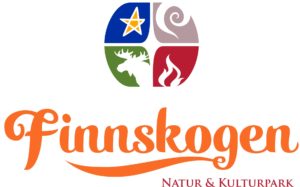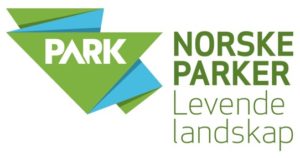Coming soon: a smartphone APP for Natura 20000 managers!
The LIFE Preparatory project, LIFE e-Natura 2000 Natura2000.edu, is creating a new Smartphone App to enable Natura 2000 site managers and private landowners to connect with each other. The App will enable users to discuss issues (and sometimes difficulties) that arise in the management of Natura 2000 lands. This practical tool will enable Natura2000 land managers to network across regions, countries, and land types.
The digital app will help Natura 2000 managers to identify issues, solve common problems that they face, communicate with each other directly, as well as learn about their professional development needs: for example, the App will act as a portal to a new online Natura 2000 Training Need Assessment (TNA) tool as well as a variety of other useful resources on the projects webpages.
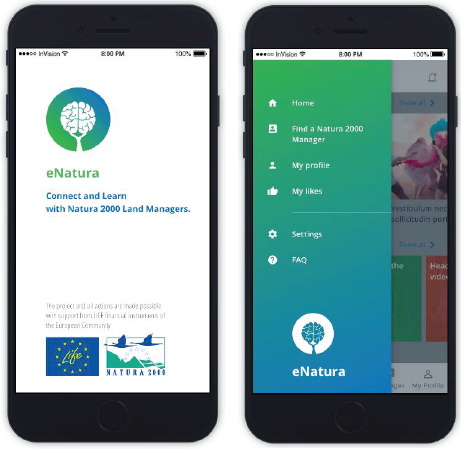
App users will be able to create ‘self-profiles’ with their background, experience, areas of expertise and interests.
App users can identify individual Natura 2000 site managers and interact with other users based on the individual profiles, as well as by biogeographical zones, countries, and languages.
The App will follow all GDPR requirements and be representative of LIFE project’s goals and initiatives. Initial testing has already begun. The App will be presented at the Forum for the Future of Agriculture on March 31st, in Brussels, where interested participants can sign up to download the app and staff from project partner ELO will be available to answer questions and demonstrate it first-hand.
If you have any questions about the App or suggestions on features that interest you, please let us know. If you’d like to experience the App when it’s ready, contact Daniel.monteleone @ elo.org and you’ll be notified as soon as the innovative digital tool is released.
“Natura 2000 in practice” Spring School
“Natura 2000 in practice” Spring School
The Spring School will take place between 6 and 10 April in Italy. It aims to disseminate in-depth knowledge on innovative aspects related to the management of Natura 2000 sites and develop technical skills together with participants on the ecological and planning tools towards the appropriate management of these protected areas. Therefore, it is an integral part of the LIFE e-Natura2000.edu project and enables managers to connect with peers.
Lectures will be carried out at the Agripolis Campus of the University of Padova and in two Natura 2000 sites: the Euganean hills (IT3260017 “Colli Euganei – Monte Lozzo – Monte Ricco”), that are also part of the homonym regional park, and the Bosco Nordio integral natural reserve (IT3250032 “Bosco Nordio”). The context of these two sites includes semi-natural habitats, agricultural and industrial developments, community settlements, and tourism services. This makes for a useful case for the management of Natura 2000 sites and related ecosystem services. The field visits will function also as a “hands on” management solutions and will enable attendees to share their experiences and concerns.

The Spring School lectures will have an interdisciplinary approach, during which active participation will be prioritised through discussions and facilitated group-work sessions. In-depth information will be given for the main concepts related to Natura 2000 management (e.g. conservation status and degree).
Linked to these relevant features, theoretical and practical information on different tools and approaches for the identification of ecological indicators, management prioritisation, ecological risk assessment, monitoring protocols, engagement strategies and participative approaches will be discussed. We will use group-work and case study examples to consider how to apply best practices in Natura 2000 sites ‘on the ground’.
This new Spring School is organised by the Department of Land, Environment, Agriculture and Forestry of the University of Padova (TESAF), EUROPARC and the project partners of “LIFE e-Natura2000.edu: supporting e-learning & capacity building for Natura 2000 managers” (LIFEedu for short).
Ocean Action! Conference in Brussels
Last February 5th, Ocean Action! brought together policy-makers, scientists, activists and artists from all over the world. Together, they called the EU for action on its commitment to protect and restore our seas and ocean and the cost of inaction was discussed.
“If the Martians were to land on the planet today, they would not call it Earth, but Ocean.” So began the Oceans conference in Brussels named #OceanAction, organised by Seas At Risk with the support of other Environmental NGOs and framed within an Ocean Week 2020 full of events dedicated to highlight the importance of the oceans in the life of the planet earth, its ecosystems, and the enormous challenge they face with the climate emergency affecting each and every one of the marine living beings and therefore, the rest of the world population.
The event consisted of a day where inspiration and emotional connection were the drivers of a collective reflection about the need to act NOW to save the future of the oceans.
The cornerstone of the event was the Blue Manifesto, an initiative presented by the Blue NGOs in Europe together with around 100 civil society organisations, which aims to act as a roadmap for a healthy ocean in 2030. Described as a rescue plan for the next ten years, it sets out a series of measures to reverse the situation of degraded oceans and coasts. Some of the important points are the measures to ensure:
- that EU seas are in good environmental status
- that EU freshwater is in good status
- the design and protection of all Natura 2000 sites from Harmful activities under the Birds and Habitats Directives
- that EU countries end overfishing under the Common Fisheries Policy
- the end of illegal, unreported and unregulated fishing
- the implementation of the Deep-Sea Regulation
We need thriving marine and coastal ecosystems to support a climate-resilient future
The event
Participants came from all over the world. From scientists and high-level decision-makers to young activists, Blue NGOs, sportsmen/women, artists and even the production team of the BBC documentary Blue Planet II.
Through presentations, interactive debates and workshops the main challenges in the future of the environmental management of the marine environment were discussed, the problems, possible solutions and necessary measures to reach them before the situation becomes irreversible for the planet and all the species that inhabit it, were also raised.
I can assure you that the name of Oceans in my portfolio is not a question of image, but the confirmation of a political will (Virginijus Sinkevičius, Commissioner for Environment, Oceans and Fisheries)
In addition, around the main presentations, there were different art exhibitions, from photography to art installations using elements collected in the sea, like plastics. Together with music and virtual reality spaces, all these inspiring elements allowed the visitor to enjoy a multisensorial experience of the oceans, human activities and the problems they both face.
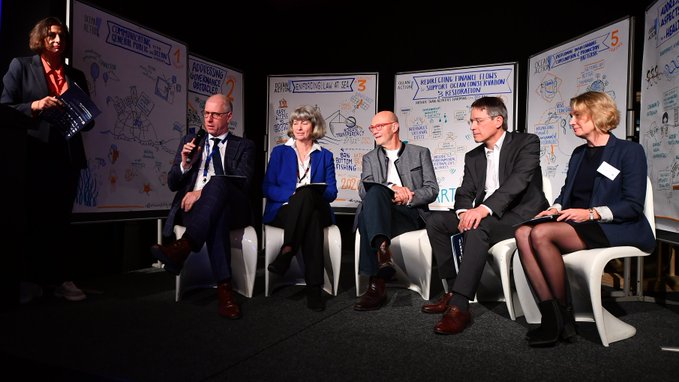
@SeasAtRisk
Call to action: Why now?
The ocean is in crisis and the situation requires effective Ocean Action
The call to action by Monica Verbeek, Executive Director of Seas At Risk, left no one indifferent. To ensure that marine areas constitute ”safe havens for animals and plants to have a break from harmful human activities and where coastal communities can enjoy a preserved nature”, it is necessary to establish a vision towards 2030, where Marine Protected Areas will play an important role in ensuring this objective, working to form an ecologically coherent and continuous network to allow species to travel from one to another and have long-term budgets, monitoring and management plans. Some of the important points to consider would be:
- By 2030, at least 30% of the ocean will be highly or fully protected
- By 2030, we will have a clean, pollution-free ocean
- By 2030, we will have shifted to low impact fishing
- In the whole ocean, the planning of human activities will support the restoration of thriving marine ecosystems
The next 10 years will determine our ability to adapt and together with sufficient political support, bring the necessary change to achieve the restoration of marine life, an end to overexploitation, destructive practices and pollution.
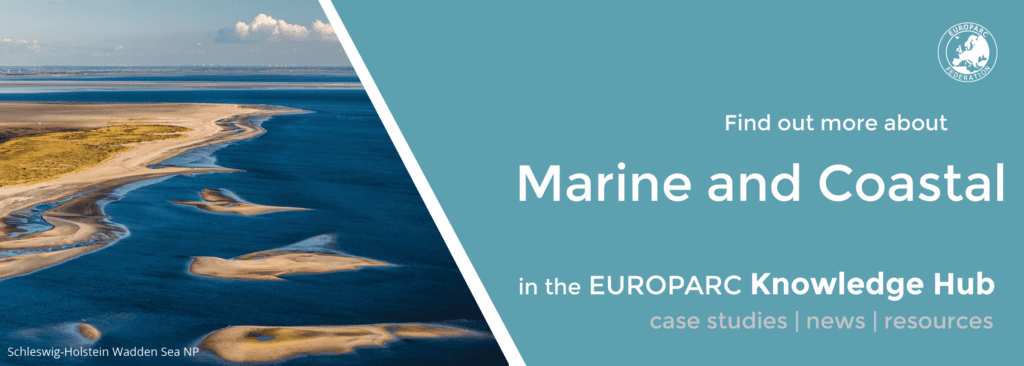
Junior Ranger Camp 2020: save the date!
Junior Rangers at Junior Ranger Camp 2017. Photo by Swiss Rangers
Norway, 5-11 July 2020
The Junior Ranger Camp 2020 will be hosted by the Norwegian Nature Parks Association in the Finnskogen Nature & Culture Park from the 5th to the 11th July.
Registrations will open very soon: stay tuned!
